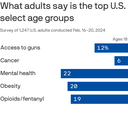Mental health is seen as a top threat, bigger than drugs and guns

Americans see poor mental health as one of the biggest threats to public health, ranking just behind obesity and the long-running opioid epidemic, according to the latest Axios-Ipsos American Health Index.
The big picture: Almost 9 out of 10 people say their own emotional wellbeing is very or somewhat good, but they view mental health issues as a serious societal threat that now outranks access to firearms, cancer or COVID-19.
- And unlike many other perceived threats, there's a pronounced generational split about mental health, registering as a much bigger concern for younger adults.
- The poll also found all but a small pocket of Americans largely tuned out a winter COVID-19 wave that saw the second-largest number of cases since the start of the pandemic, and the public is skeptical about handing over their care to artificial intelligence.
By the numbers: Overall, 17% said mental health was the top threat to public health, while 19% said obesity, 24% said opioids and fentanyl, and 15% said it was access to guns.
- In the first time our polling asked about mental health as a public threat, it was the top concern for young adults ages 18-29 (22%), who were twice as likely as those 65 and older to say the same (10%).
- Seniors were about twice as likely to say access to guns was the biggest threat.
- Meanwhile, 30% of Democrats called guns the biggest threat, compared with 4% of Republicans.
- Republicans were twice as likely as Democrats to identify opioids and fentanyl as the top threat (32% vs. 16%).
Between the lines: The poll also found support for policies for making health care more affordable and accessible, even while there's low awareness of President Biden's key health care achievements.
- 9 in 10 favor health insurers covering mental health care on par with physical health care. That includes about two-thirds who strongly back the idea, with support strongest among women, Democrats and Black Americans.
- 84% support the government more aggressively wielding anti-monopoly powers to prevent pharmaceutical companies getting too large or dominant, including 55% who strongly support that.
- About 3 in 4 support continuing Affordable Care Act health insurance subsidies and capping out-of-pocket prescription drug costs at $2,000, as the Inflation Reduction Act will soon do for Medicare.
- But only 24% were very or somewhat aware that a record number of people signed up for ACA plans in the most recent enrollment period, and 33% were at least somewhat aware that the U.S. government is negotiating drug prices on behalf of Medicare recipients.
- "It's a consistent through line for the administration — there seems to be a disconnect between their messaging on health care and the economy and the public just not being aware or in touch with what's actually happening," said Ipsos vice president Mallory Newall.
On COVID-19, the winter surge in cases wasn't matched by an increase in concern over the virus or changes in how infrequently Americans are masking or testing these days.
- About 17% said they masked in public settings at least some of the time, down about half from a year ago. About 15% continue to say they tested at home one time or less in the past week.
- 3 in 10 were aware that the Centers for Disease and Control Prevention may ease isolation guidance.
- "Despite the uptick in cases, concern over the virus, and how closely Americans are paying attention to what's going on, is pretty lukewarm," Newall said.
Zoom in: Few said they were familiar with the expanding role of AI in the health care system, but there's unease about cutting out their doctor's judgment.
- 72% said they are comfortable with letting AI schedule appointments, and more than half (53%) are comfortable with letting it deliver test results.
- Just under half are comfortable with AI helping a physician make a diagnosis or ask basic health questions. They're far less comfortable with the idea of AI making a diagnosis on its own (16%).
- "There may be a place for AI in health care, but it's still a little iffy for folks. Doing the basics like scheduling appointments or some basic triage is OK, but anything beyond that is still a bridge too far for many Americans," Newall said.
Methodology: This Axios/Ipsos Poll was conducted Feb. 16-20 by Ipsos' KnowledgePanel®. This poll is based on a nationally representative probability sample of 1,247 general population adults age 18 or older.
- The margin of sampling error is ±3.0 percentage points at the 95% confidence level, for results based on the entire sample of adults.